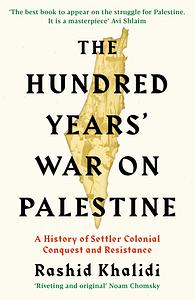Take a photo of a barcode or cover
challenging
informative
reflective
tense
slow-paced
nonfiction is hard to review when it is done well. Very dense in information, audio book was somewhat monotoned but necessary to assist in pronunciation of certain words. Overall very well made, written, and filled with information I never realized as a white American.
A poignant account of the colonization of Palestine told through the lens of personal anecdotes mixed with historical research. Khalidi drops you right into each "phase" without always providing an explanation for certain terms or concepts, but this approach lends itself to a fluidity that makes reading historical non-fiction less intimidating. Khalidi's writing was accessible and engaging, and this book provided essential context in understanding the past century and how we arrived at the present-day violence against and dispossession of Palestinians.
This is a good overview and I would recommend it, especially since everyone seems to be reading it right now.
Khalidi has a deeply critical view of Arafat and the PLO. He provides a useful narrative of the cultural revival of the Palestinian cause in the 60s and 70s, both in Palestine and globally. However, he goes on to show how the PLO’s strategic mistakes undermined their own support among Palestinians and how their naiveté with regard to the US (especially in the late 80s and early 90s) trapped them into the calamitous Oslo path. The unreliability of the Arab monarchies also comes through quite clearly in the narrative here.
The major weakness of the book, in my opinion, is its obsession with elite-level politics and the granular details of diplomacy. An editor could have taken out tens of thousands of words on this and the book would lose almost nothing but be much more readable. More to the point, this book contains almost zero social history and has no class analysis, it’s all academics, diplomats, and political leaders. Although there are many useful insights within that realm, the unfortunate effect of this approach is to implicitly render the Palestinians as objects of history, if not victims, rather than agents of their own liberation. In the current moment, that seems like less of an academic hairsplitting exercise than a misrecognition of the clear reality. The lack of class analysis also means there are few tools provided to make sense of the frequently referenced political “fragmentation,” “disarray,” and “disunity” among Palestinians political parties and actors.
Khalidi has a deep grasp of the social pressures, incentives, and constraints of diplomats and officials both in Palestine and in the US, as well as the imperial priorities in that relationship which doesn’t include any care for Palestinians. The last two chapters are particularly useful summaries in this regard.
The description of massacres in 1956 could have been written today about Israel’s current genocide in Gaza:
Khalidi has a deeply critical view of Arafat and the PLO. He provides a useful narrative of the cultural revival of the Palestinian cause in the 60s and 70s, both in Palestine and globally. However, he goes on to show how the PLO’s strategic mistakes undermined their own support among Palestinians and how their naiveté with regard to the US (especially in the late 80s and early 90s) trapped them into the calamitous Oslo path. The unreliability of the Arab monarchies also comes through quite clearly in the narrative here.
The major weakness of the book, in my opinion, is its obsession with elite-level politics and the granular details of diplomacy. An editor could have taken out tens of thousands of words on this and the book would lose almost nothing but be much more readable. More to the point, this book contains almost zero social history and has no class analysis, it’s all academics, diplomats, and political leaders. Although there are many useful insights within that realm, the unfortunate effect of this approach is to implicitly render the Palestinians as objects of history, if not victims, rather than agents of their own liberation. In the current moment, that seems like less of an academic hairsplitting exercise than a misrecognition of the clear reality. The lack of class analysis also means there are few tools provided to make sense of the frequently referenced political “fragmentation,” “disarray,” and “disunity” among Palestinians political parties and actors.
Khalidi has a deep grasp of the social pressures, incentives, and constraints of diplomats and officials both in Palestine and in the US, as well as the imperial priorities in that relationship which doesn’t include any care for Palestinians. The last two chapters are particularly useful summaries in this regard.
The description of massacres in 1956 could have been written today about Israel’s current genocide in Gaza:
Given the precedent of 1948 and the civilian massacres at Dayr Yasin and at least twenty other locations, as well as the high civilian casualties in the raids of the early 1950s, such as that at Qibya, the gruesome events in the Gaza Strip were not isolated incidents. They were part of a pattern of behavior by the Israeli military. News of the massacres was suppressed in Israel and veiled by a complaisant American media.
informative
reflective
sad
medium-paced
challenging
dark
emotional
informative
reflective
sad
tense
slow-paced
informative
medium-paced
informative
sad
slow-paced
This is an excellent perspective on Palestine for people who aren't familiar with the history. While it can be understandably dense, I still found it fairly easy to follow.
Knowing so little about Palestinian history meant that things were a little difficult for me when I began the book, at around the 30% mark I was much more comfortable. I think that speaks to how effectively the author conveys information.
I'd say it's a great jumping off point to start learning more about how things became the way they are now.
Free Palestine 🇵🇸
Knowing so little about Palestinian history meant that things were a little difficult for me when I began the book, at around the 30% mark I was much more comfortable. I think that speaks to how effectively the author conveys information.
I'd say it's a great jumping off point to start learning more about how things became the way they are now.
Free Palestine 🇵🇸
informative
reflective
sad
medium-paced
Thoroughly researched. The primary source material was remarkable. A truly depressing but necessary read, especially since so much of what is happening now has undeniable parallels to 1962, 1984, and 1987. Everyone who wants to cut through the propaganda and look at the historical source material to better understand this conflict should read this book.




